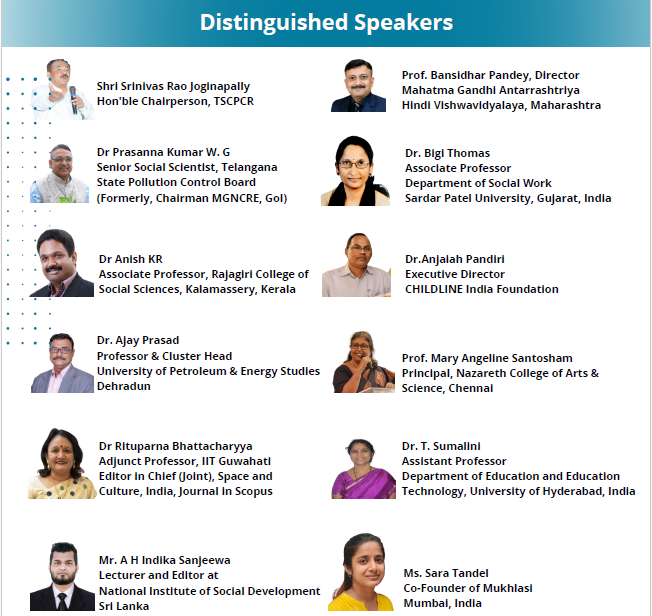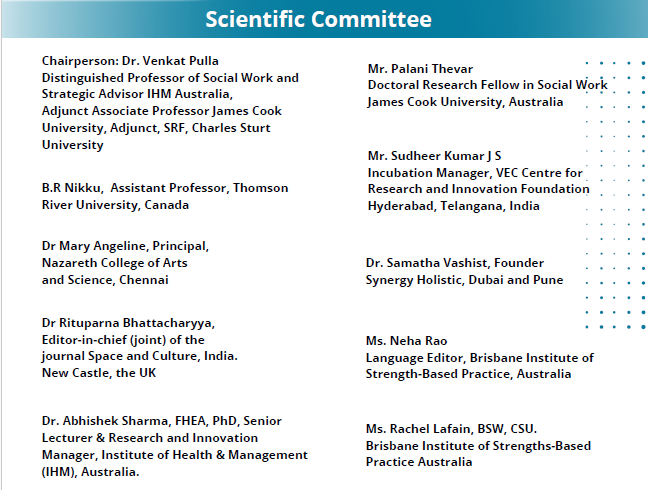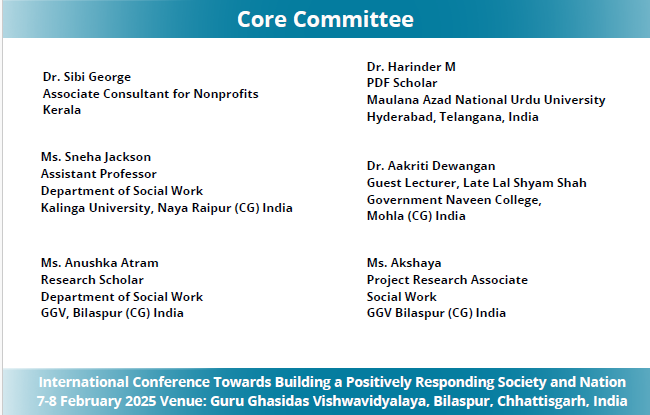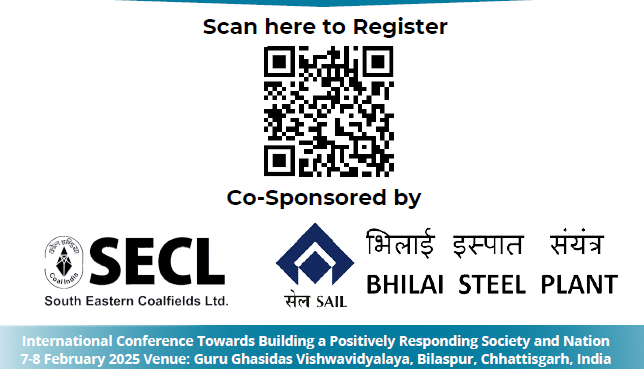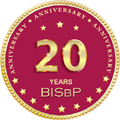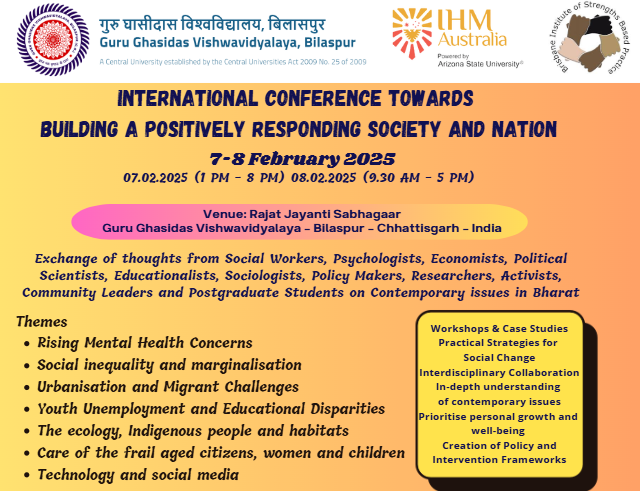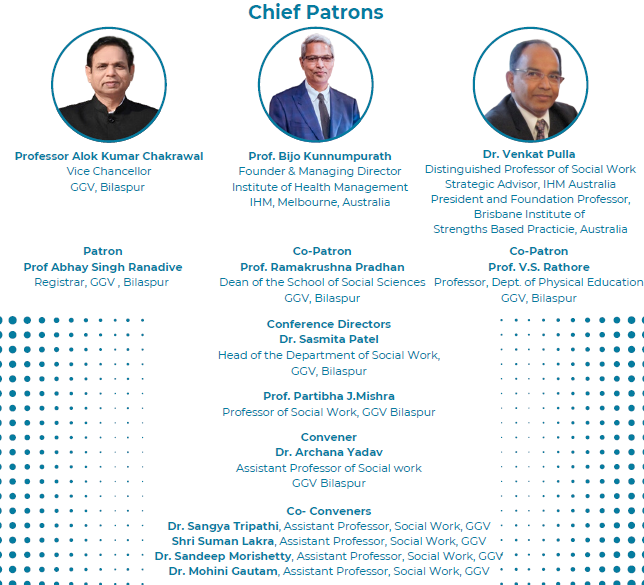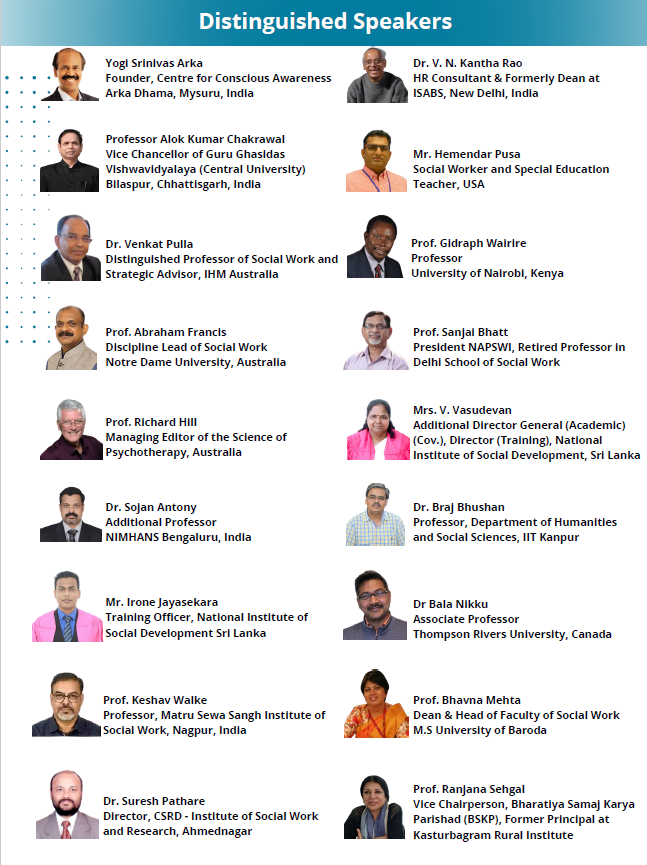INTERNATIONAL CONFERENCE
TOWARDS BUILDING A POSITIVELY RESPONDING SOCIETY AND NATION
7 - 8 FEBRUARY
2025 BILASPUR, CHHATTISGARH, INDIA
A Brisbane Institute of Strengths Pro Bono collaboration for the advancement of leadership and knowledge in a predominantly tribal state of Chhattisgarh, India
This event is organized by the Brisbane Institute of Strengths-Based Practice (BISBP), the Institute of Health Management (IHM), and GGV, with Dr. Venkat Pulla serving as the conference chair.

The conference venue and most of your accommodation are provided at
GGV Campus, Bilaspur, Chhattisgarh State, India


Conference Attendees Include
Academics, practitioners, research scholars, and students from social work, psychology, HR and management, occupational therapy, physiotherapy, public health, social sciences, political science, public administration, business management, information technology, artificial intelligence, and futurology.
Practitioners, especially from the Human Resource (HR) and management practice, government, policymakers, allied health managers, medical administrators, hospital & nursing home managers, allied health workers, and managers of public systems and community work.
Registration
Category | Currency | Bank Account details for payment. |
SAARC Nations (Including Indian Participants) | INR 2000 | State Bank of India, A/C No. No. 37137162271, IFSC: SBIN0018879, Account Name: REG GURU GHASIDAS UNI BILASPUR |
Other Developing Countries | USD 250 | |
Developed Countries | USD 350 | |
Ph.D. students from India | INR 1000 | |
BSW/MSW/Other Students | INR 1000 | |
Faculty Members | INR 1500 |
Please email to:
dr.venkat.pulla@gmail.com
boon.sudheer@gmail.com
Send your Name and Email/ University/ Agency/ Designation.
Country of Citizenship and Country from where you will be travelling:
Category of Participation:
Invited Speaker/Chair/Presenter-Paper/Presenter-Poster/Discussant/Research Scholar/Student (Undergraduate)/Postgraduate
Accommodation advice: Guest house/hostels?Hotels / / Twin share only / Dormitory/ (first come, first served)
The conference accommodation on campus costs would be advised.
Dr Archana Yadav (archana.astha@gmail.com) and a copy to Dr M. Harinder (mharinder@gmail.com).
Dates to Remember
- Abstract Submission date by 30 December 2024
- Abstracts Approved with suggestions: 5th January 2025
- Full papers 4000 words to be submitted by January 20, 2025
- Late abstracts will be considered within reason.
Important Points to Note:
- Modest meals and Breakfast will be provided to all registered participants within the registration costs
- Accommodation will be provided in the University Guest House/Hostel (as per availability) on a payment basis. Please enquire about costs (archana.astha@gmail.com).
- We can also provide contact details of nearby hotels/lodges to the participant on their demand.
- If participants stay in Bilaspur hotels, they will take care of their dinners, etc. No rebate is provided from the registration amount.
- No T.A. /D.A. will be provided to the participants.
Themes in the conference
INTRODUCTION
Contemporary issues in Bharat
The conference, “Towards Building a Positively Responding Society and Nation,” comes at a critical time for India, which is facing myriad social, economic, and psychological issues. From the increasing speed of urbanisation to the long-term repercussions of the COVID-19 pandemic, India’s communities are dealing with complex concerns that necessitate coordinated, multidisciplinary responses. The conference will delve into these modern concerns and propose intervention options based on social work, psychology, and social sciences. By investigating the roles of various professions, the conference will enable attendees to take proactive actions towards creating a resilient, inclusive, and positively reacting society. It will also promote practical discussions that bridge the barriers between academia, community service, and public policy. Bharat with its huge and diversified population has several concerns to deal with on its way to the development of a robust and inclusive society necessitating imaginative, community-focused solutions. The Conference therefore is an attempt to discuss some selected issues as follows.
The conference allows for creative and innovative thinking, as well as the exploration of out-of-the-box solutions for a lively, resilient, and hopeful future.
Themes of the Conference
- Rising Mental Health Concerns:
According to the National Mental Health Survey (2015-16), over 15% of India’s population has mental health difficulties, with an increase in cases of anxiety, depression, and suicide, particularly among young people. The stigma around mental health remains a significant barrier to obtaining help.
Impact of COVID-19: The epidemic aggravated mental health issues, causing an increase in cases of stress, anxiety, and despair. This has necessitated a renewed emphasis on mental health and emotional resilience in communities across India.
Mental health practitioners, social workers, and policy experts will have the chance to debate how psychological resilience, treatment, and community-based mental health initiatives may address these concerns, particularly in rural and underserved areas.
- Social inequality and marginalisation
Caste, gender, and economic disparities continue to marginalise huge segments of Indian society, contributing to systemic inequity. Women, Dalits, Adivasis, and other marginalised communities frequently encounter discrimination in education, employment, healthcare, and social services.
Poverty and Access to Resources: Despite substantial economic growth, India still has the world’s largest impoverished population. In rural areas, access to basic services such as healthcare, sanitation, and education is limited, exacerbating the inequality.
Discussions on social justice, inclusion, and equity will allow attendees to consider ways to address both individual and systemic inequities. The conference will also showcase community-based strategies for closing socioeconomic inequalities and promoting inclusive policies.
- Urbanisation and Migrant Challenges
Urbanisation: India’s fast urbanisation is putting tremendous strain on its cities, resulting in overcrowding, environmental deterioration, and inadequate infrastructure. Urban migrants, particularly those from rural areas, encounter challenges in finding cheap housing, education, and healthcare.
Migrant Mental Health: Displacement, prejudice, and poor living conditions can cause mental health issues among migrants, particularly labourers and refugees.
The conference will provide insights into how social workers, psychologists, and urban planners may collaborate to fulfil migrants’ social and psychological needs, as well as policy frameworks for long-term urban development.
- Youth Unemployment and Educational Disparities.
Youth Employment Crisis: India’s vast youth population suffers issues such as unemployment, underemployment, and skill mismatch. Despite improvements, the educational system continues to struggle to meet the demands of a quickly changing labour market.
Lack of Psychological Support for Youth: Many young people in India experience career-related stress, academic pressure, and a lack of support structures, which can lead to anxiety, sadness, and even suicidal thoughts.
The conference will discuss how psychology, social sciences, and social work can help with youth empowerment, career counselling, and mental health support. It will also address the need for educational reforms to provide young people with practical skills for future work.
- The ecology, Indigenous people and habitats:
The impact of environmental deterioration and change on communities, including increased natural disasters, relocation, and food insecurity. Coastal communities, rural regions, and urban slums are disproportionately affected.
Psychosocial Impact: Environmental changes can cause eco-anxiety, displacement trauma, and stress, particularly among vulnerable people.
The interface of social work, psychology, social sciences and environmental sustainability will be investigated, with a focus on developing resilient communities capable of dealing with environmental concerns.
- Technology and social media:
Despite India’s rapidly developing digital landscape, the rural-urban divide in access to technology and the internet remains a significant obstacle to educational and economic prospects.
The role of social media in Mental Health: Social media use, particularly among young people, has been related to mental health problems such as body image disorders, cyberbullying, and social anxiety. The impact of digital technology on social connections, privacy, and mental health remains a major source of worry.
The discussions will centre on how social workers, psychologists, and social scientists may use technology to improve well-being and establish welcoming digital communities. The conference will look at ways to bridge the digital gap and use technology to drive positive social change.
Best Paper and Poster Awards
All attendees are assumed to enter the contest unless the conference is informed otherwise.
The awards are offered in the following categories:
(1) Professionals
(2) Academics
(3) JRF awards
(4) Student/Undergraduate and
(5) Postgraduate awards
The awards include a return of conference registration fees and or a cash award
Publications: In addition to the Abstracts Book, select papers will be commissioned with a reputed publishing house and released.
The Conference guarantees select Post-Conference Publications of blind peer-refereed papers and mentored papers in a range of pre-negotiated Journals across the world. These publications are naturally included in Scopus, UGC- India list, Erihplus, Web of Science, Pub Med SJR, DOAJ, ProQuest, Open Access, SJR, ISSN Portal, Scilit, Google Abstracts, Copernicus, ERA- Australia, Google Scholar, and others.
Media Note: It is assumed that participants accept the recording of the conference, including digital media for post-conference display, unless the conference is informed otherwise.
The Principal Organisers
The Brisbane Institute
Since its foundation, the Institute has provided meaningful and inexpensive conference and training programs that bring together NGOs, governments, private and corporate sectors, international organizations, universities, and research institutes to debate ideas to improve Australia and the world. The institute believes in breaking silos and brings together social work and human services educators and practitioners to listen, co-present with allied health colleagues, and use transdisciplinary and interdisciplinary methodologies.
Since 2010, Griffith University has been our Australian and international community partner, while James Cook University has collaborated twice.
Dr. Venkat Pulla founded the Institute in 2006 to assist the spread of strengths-based practices and self-reliance. Social work, psychology, media, accountancy, and digital art specialists form the board. The true partners of the institute are its participants and benefactors. We’ve collaborated with strengths-based psychiatry, social sciences, human services, biology, neuro-sciences, pure sciences, Aboriginal people’s development, education, and management professionals and laypeople.
Participants from all over the world have found our conferences and training meaningful, as the dialogue and journey promoted at these events boost resilient practices and hope.
GURU GHASIDAS UNIVERSITY, BILASPUR, CHHATTISGARH
Guru Ghasidas Vishwavidyalaya is a Central University of India, located in Bilaspur Chhattisgarh State, established under the Central Universities Act 2009, formerly called Guru Ghasidas University (GGU), established by an Act of the State Legislative Assembly, was formally inaugurated on June 16, 1983. GGV is an active member of the Association of Indian Universities and the Association of Commonwealth Universities. Situated in a socially and economically challenged area, the university is appropriately named to honour the great Satnami Saint Guru Ghasidas (born in the 17th century), who championed the cause of the downtrodden and waged a relentless struggle against all forms of social evils and injustice prevailing in the society.
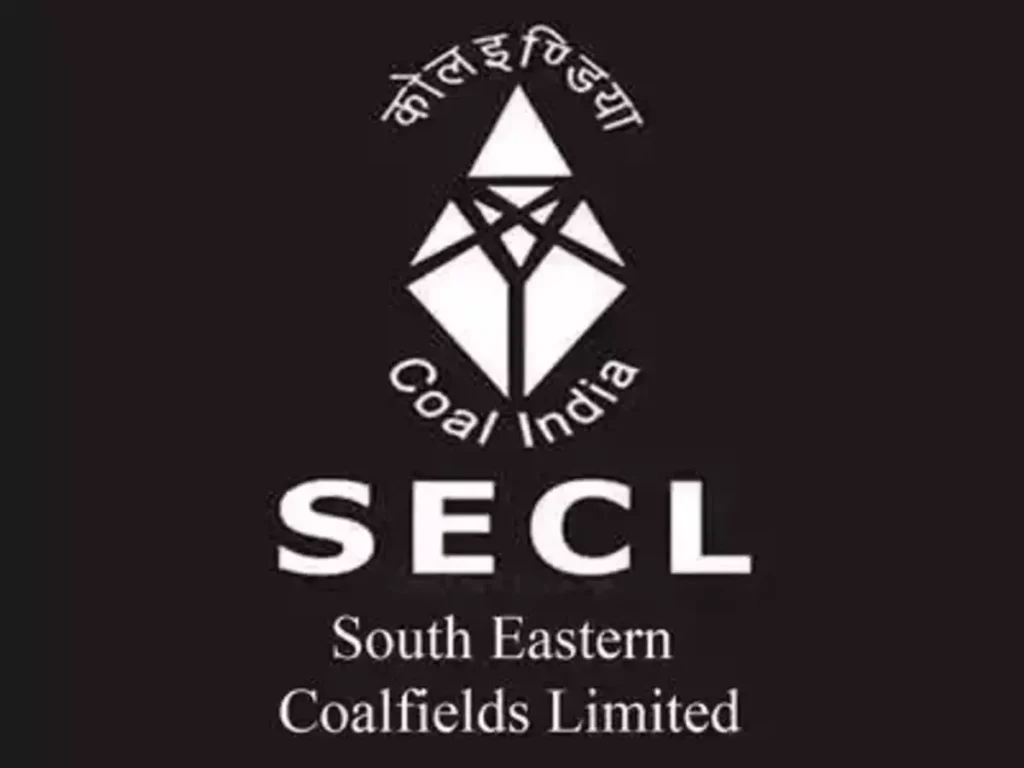
The Guru Ghasiram Vishvavidyalaya has been generously supported in undertaking this conference by South Eastern Coalfields Limited (SECL), which is the largest coal-producing company of India. It is a “Miniratna” company and one of eight fully owned subsidiaries.
The Brisbane Institute strives to make a difference with common goals and a compassionate approach to people and the environment. This conference is dedicated to the tribal population of Chhattisgarh. All aspects of the conference are graciously looked after by the institute, including maximising the tribal student community pro bono.
